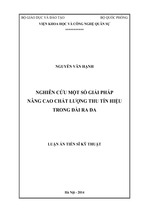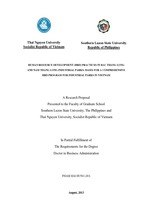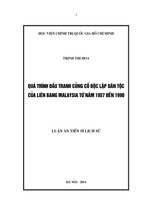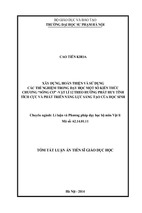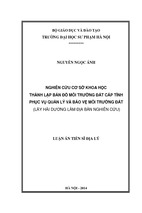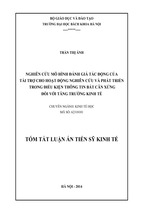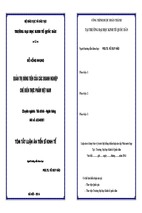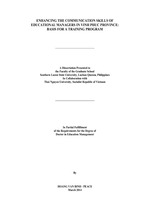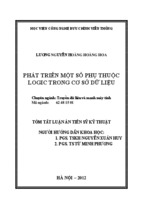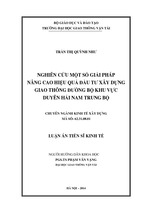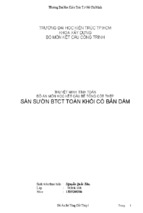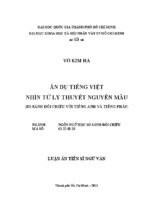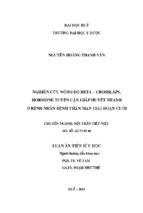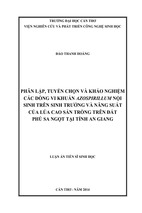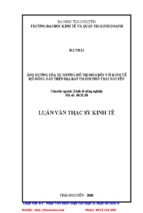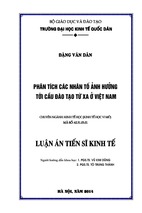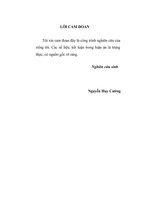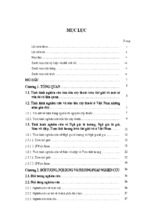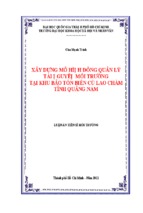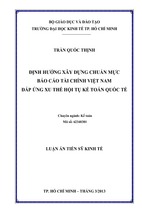i
THAI NGUYEN UNIVERSITY
Socialist Republic of Vietnam
BATANGAS STATE UNIVERSITY
Republic of the Philippines
ECOLOGICAL CONCERN AND SUSTAINABILITY
IN THE SELECTED WORKS OF AL GORE
A Dissertation
Presented to the
Faculty of the Graduate School
Batangas State University
Batangas City, Philippines
In Partial Fulfillment
of the Requirements for the Degree
Doctor of Philosophy in English
by
PHUNG THI THU HA (River)
November, 2014
ii
BATANGAS STATE UNIVERSITY
Republic of the Philippines
THAI NGUYEN UNIVERSITY
Socialist Republic of Vietnam
ABSTRACT
Title
: Ecological concern and sustainability in the selected
works
of Al Gore
Author
: Phung Thi Thu Ha
Course
:Doctor of Philosophy major in English language and literature.
Year
: 2014
Adviser
: : Dr. Maria Luisa A. Valdez
Summary
The main focus of this study was to determine the ecological
concern and sustainability in the selected works of Al Gore
This study made use the qualitative philosophical method of
research in analyzing the tenets of environmental issues and concerns in
the representative literary works chosen.
The findings of the study revealed the following main points:
1. Global warming and climate crisis have caused a major impact on the
environment as ecological variables all over the world, putting the habitats of
the species on Earth under serious threat.
2. Earth with its bounty and inherent beauty has been the place for all
things on Earth to shelter and develop, including humans.
iii
THAI NGUYEN UNIVERSITY
Socialist Republic of Vietnam
BATANGAS STATE UNIVERSITY
Republic of the Philippines
3. To cater to the needs of life, people with irresponsible actions and their
lack of awareness have overexploited the resources of the world, making
the 'Earth' no longer 'in Balance' as it used to be
4. The world needs to determine jointly implement environmental measures
such as reducing the growth rate of world population, reducing the
consumption of fossil energy, instead, using sparingly and effectively clean
energy such as solar energy, wind energy; and to balance the economic
development of industrial parks, agriculture, and tourism services with
social benefits and environmental sustainability. .
5. By combining devices such as simile, alliteration, metaphor, metonymy
and rhetorical questions, Al Gore gave readers the deep awareness of
environmental issues that concern the entire world.
6. Environmental Issues author Al Gore refers to in the two selected works
are very valuable for education on environmental awareness for
Vietnamese youth in particular and Vietnamese people in general.
iv
THAI NGUYEN UNIVERSITY
Socialist Republic of Vietnam
BATANGAS STATE UNIVERSITY
Republic of the Philippines
ACKNOWLEDGEMENTS
On the completion of this dissertation, I wish to express my deepest
gratitude to my supervisor, Dr. Maria Luisa A. Valdez, who has supported
me though out my dissertation with her great patience and precious
guidance whilst encouraging me with all her warm and kind heart. Without
her great help and assistance my attribution to the level of my PhD. Degree
would have not been accomplished.
My special thanks go to Dr. Matilda H. Dimaano, Dr. Corazon
Cabrera and The Panels for their highly intellectual abilities to give me
excellent advice and previous guidance during my preparation of this work.
I would like to take this chance to give expressions to my gratitude to
all the teachers at the Graduate School of Batangas State University of the
Philippines for their valuable lectures and precious guidance that spur me
to come to the choice of carrying out this research.
I also wish to acknowledge the Philippines Government which sends
each time with the most skilful and qualified lecturers to Thai Nguyen
University. The cooperation between Vietnam and the Philippines should
be a lesson for other countries in the region to make their education better
and gain integration.
I am indebted to ITC, Thai Nguyen University of Agriculture and
Forestry of Thai Nguyen University for accepting me as a PhD. Student
v
THAI NGUYEN UNIVERSITY
Socialist Republic of Vietnam
BATANGAS STATE UNIVERSITY
Republic of the Philippines
and for their enthusiasm and supports during the time of my studying and
writing this thesis.
I greatly appreciate the sympathy and assistance and spiritual
supports from my dear colleagues and students for me during my PhD.
study.
My sincerest gratitude would go to all my dear PhD. classmates for
their friendliness, kindness, and big support and encouragement.
I am also very grateful for the wholehearted support, encouragement
and love that my parents, my husband and children, along with my sisters
Ms. Tuyet, Ms. Huong, and Ms. Hong extended during my completion of
the dissertation.
Once again I would like to say thank-you to all for everything.
vi
THAI NGUYEN UNIVERSITY
Socialist Republic of Vietnam
BATANGAS STATE UNIVERSITY
Republic of the Philippines
TABLE OF CONTENTS
ABSTRACT.............................................................................................ii
ACKNOWLEDGEMENTS......................................................................iv
TABLE OF CONTENTS.........................................................................vi
CHAPTER
I. THE PROBLEM ....................................................................................1
Introduction .....................................................................................1
Statement of the Problem .............................................................11
Scope, Delimitation and Limitation of the Study ...........................12
Significance of the Study ..............................................................15
II. REVIEW OF LITERATURE: SYNTHESIS AND HYPOTHESIS........19
Conceptual Literature....................................................................19
Research Literature ......................................................................31
Synthesis of the Literature Reviewed ...........................................39
Theoretical Framework .................................................................41
Conceptual Framework .................................................................44
Definition of Terms ........................................................................45
III. RESEARCH METHODOLOGY.........................................................51
Research Method..........................................................................51
Research Procedures ...................................................................52
vii
THAI NGUYEN UNIVERSITY
Socialist Republic of Vietnam
BATANGAS STATE UNIVERSITY
Republic of the Philippines
Treatment of Materials ..................................................................54
IV. ANALYSIS AND INTERPRETATION OF DATA .............................57
V. SUMMARY, CONCLUSION AND RECOMMENDATION ...............229
Summary.....................................................................................229
Findings.......................................................................................230
Conclusions.................................................................................251
BIBLIOGRAPHY
CURRICULUM VITAE
1
THAI NGUYEN UNIVERSITY
Socialist Republic of Vietnam
BATANGAS STATE UNIVERSITY
Republic of the Philippines
CHAPTER 1
THE PROBLEM
Introduction
The world has witnessed the increasing effects of the global climate
change for more than two centuries with so many disastrous calamities in
the past recent decades. This subject matter has become an interesting
topic for many writers who are concerned with the environmental issues. It
has been proved that there are a variety of factors that lead to this
unpleasant fact including oceanic processes (such as oceanic circulation),
biotic processes, variations in solar radiation received by Earth, plate
tectonics and volcanic eruptions, and human-induced alterations of the
natural world; these latter effects are currently causing global warming.
Among many causes leading to climate change and global warming,
‘green house effects’ and emissions of toxic gases such as carbon Dioxide
(CO2)
and
methane
are
considered
as
the
major
ones
(http://planetsave.com/2009/06/07/global-warming-effects-and-causes-atop-10-list/). Global warming is one of the biggest issues that we, human
beings, are facing right now. In fact, the effects of the global warming on
animals and on agriculture are alarming, and the effects on the human
population are even more frightening. The facts about global warming are
often debated in politics and the media. The causes are believed mainly
2
THAI NGUYEN UNIVERSITY
Socialist Republic of Vietnam
BATANGAS STATE UNIVERSITY
Republic of the Philippines
from us, the human race, and the effects on us will be much more severe
in the future.
A warming planet thus leads to a great change in climate called
climate crisis which can affect all the living things on earth. Global warming
brings about environmental issues that lead to serious ecological
consequences for not only the generations at present but also the
generations in the future. Such effects include a dramatic increase of sea
temperatures, high sea level, rapid decrease of sea ice, more melting
glaciers, an emerging global crisis in water availability and water pollution;
extinction, loss of biodiversity and long-term damage to ecosystems;
pollution of the atmosphere; waste production and disposal; impacts of
chemicals
use
and
toxic
substance
disposal;
damaged
aquatic
ecosystems; and deforestation and land degradation.
The climate change and biodiversity has long been correlated.
Although throughout Earth’s history the climate has always varied with
ecosystems and species coming and going, rapid climate change has a
great influence on ecosystems and species ability to adapt and this
increases biodiversity loss. The United Nations’ Global Biodiversity Outlook
3 (2010) confirms that ‘Climate change is already having an impact on
biodiversity, and is projected to become a progressively more significant
3
THAI NGUYEN UNIVERSITY
Socialist Republic of Vietnam
BATANGAS STATE UNIVERSITY
Republic of the Philippines
threat in the coming decades.’ Loss of Arctic sea ice is really threatening
since it is damaging biodiversity ‘across an entire biome and beyond’. The
Outlook 3 points out ‘The related pressure of ocean acidification, resulting
from higher concentrations of carbon dioxide in the atmosphere, is also
already being observed.’
Apart from the fact that temperatures are
becoming warmer, ‘more frequent extreme weather events and changing
patterns of rainfall and drought can be expected to have significant impacts
on biodiversity.’
The climate crisis is believed to create more extreme and
unpredictable weather patterns in the future such as: more hurricanes,
super-storms and drought; longer terms of dry heat or heavy rain.
Scientists have figured out that Northern Europe could be seriously
affected with colder weather if climate change continues, as the Arctic
begins to melt and send fresher waters further south. It would effectively
cut off the Gulf Stream that brings warmth from the Gulf of Mexico, keeping
countries
such
as
Britain
warmer
than
expected.
The
global
warming effects on the Indian subcontinent vary from the submergence of
low-lying islands and coastal lands to the melting of glaciers in the Indian
Himalayas, threatening the volumetric flow rate of many of the most
important rivers of India and South Asia, causing water scarcity for a long
period. In India, such effects are projected to impact millions of lives. As a
4
THAI NGUYEN UNIVERSITY
Socialist Republic of Vietnam
BATANGAS STATE UNIVERSITY
Republic of the Philippines
result of ongoing climate change, the climate of India has become
increasingly inconsistent over the past several decades; this tendency is
supposed to keep going on.
Sharing the same situations with South Asia in general and India in
particular, Vietnam, a small country with a population of nearly ninety
million, is also facing many environmental problems related to water
pollution and loss of biodiversity and long-term damage to ecosystems.
The living standard of people in industrial regions has been directly
damaged by the quality of water resources under threat from dumped
industrial and chemical wastes, untreated sewage, and medicinal residues
and fertilizes and chemical run off. These real situations make the already
existing problems of water pollution in Vietnam become worse and one of
the direct consequences of this matter is that there are more and more
Vietnamese people suffering from such common waterborne diseases as
cholera, typhoid
fever, dysentery, bacterial
diarrhea,
and hepatitis.
According to WHO, the number of water, sanitation, and hygiene
attributable deaths in 2004 in Viet Nam was 5938. A noticeable fact was
that out of 5938 deaths, 4905 were children under five years which means
that the children were the main victims of the water, sanitation and hygiene
related problems.
5
THAI NGUYEN UNIVERSITY
Socialist Republic of Vietnam
BATANGAS STATE UNIVERSITY
Republic of the Philippines
Mining industry is another factor that contributes to making
environmental issues in Vietnam more serious. This has been discussed in
detail in many mass media; and several workshops, both on national
scales and international scales, have been organized, but it seems that not
many improvements have been made while many mining companies such as coal mining companies in Quang Ninh Province, titanium mining
areas, mostly located in the two districts of Phu My and Phu Cat, Ba Ria –
Vung Tau province, Quang Thuan One-Member Co. Ltd in Thuan Nam
District, Ninh Thuan Province, and Nui Phao mining company in Thai
Nguyen province - continue digging up the soils to explore and exploit
metals and minerals from the underground. Part of minerals and metals
which are toxic is absorbed by farm land and run into water resources
around. Due to the unconsciousness of the exploiters and the lack of
control of the related authorities, the natural resources exploitation has
badly affected local people’s lives for quite a long time. The residents
nearby mainly suffer problems such as terrible diseases like cancers, and
most of them receive nothing as compensation from those companies.
Together with the global warming and climate change called the
climate crisis, the rapid population growth, the irresponsibility of humans in
their daily activities for the environment and their thirst for immediate
economic benefits are added to the long list of factors that are seriously
6
THAI NGUYEN UNIVERSITY
Socialist Republic of Vietnam
BATANGAS STATE UNIVERSITY
Republic of the Philippines
damaging the ecosystem on earth, the common house of all living things
including plants, animals, and humans. This inconvenient truth has put the
planet Earth in its unbalanced state and it has been reflected in many
newspapers, magazines, journals, books and other kinds of literature.
Literature is about human beings – their daily lives as well as their
exceptional, towering experiences, which literary critics stress, are
therefore a dissection of life (Luisa, 2006). Literature functions as a mirror
to reflect life. It focuses readers on taking the world around them into
consideration. Literature is encyclopaedia about life. It helps humans be
aware of life and aware of themselves as well. Literature not only enriches
humans’ knowledge but it can also help arouse humans’ emotions, feelings
and nurture their souls and confidence in life. Through the awareness of
life, humans can choose the best way to improve their life, turning their
knowledge into real actions.
The fact that writers use their literary works to reflect their societies
has been widely known. It is unlikely to find a literary work that neither
expresses an attitude nor include morale and values of the society, since
no authors have the experience of being brought up completely unexposed
to the world around them. Literary works are created to depict human life
and action through some characters who, by their words, action and
reaction, transmit certain messages for the purpose of information,
7
THAI NGUYEN UNIVERSITY
Socialist Republic of Vietnam
BATANGAS STATE UNIVERSITY
Republic of the Philippines
education, and entertainment. The author also shows his personal
implications through his work based on his own philosophy of life.
Literature not only reflects the society but serves as a mirror in which
members of the society can look at themselves and see the need for
positive change.
As stated above that the planet Earth is experiencing a climate crisis
and that this unpleasant reality has drawn the profound attention of many
writers who concern themselves with ecological issues and Albert Arnold Al
Gore or Al Gore is one of them. Al Gore was born in Washington D.C on 31
March 1948 and was the son of a former Tennessee Senator father. He
went to school in Washington D.C. He enjoyed sport and he studied quite
well at school. In 1965 he graduated 25th in his class of 51, then he
applied for Harvard University and was accepted. At university he became
passionate in politics and interested in the topic of global warming after
taking a course with Professor Roger Revelle, one of the first scientists to
measure carbon dioxide in the atmosphere. Maybe the first meeting with a
famous expert in environment was a decisive factor in his successful
career in great efforts to protect environment and raise people’s awareness
of the risks of climate change and global warming and ecological concerns.
After two years of serving in the Vietnam War as a military reporter from
1969 through 1971, Al Gore studied philosophy and law at Vanderbilt
8
THAI NGUYEN UNIVERSITY
Socialist Republic of Vietnam
BATANGAS STATE UNIVERSITY
Republic of the Philippines
University while working for The Tennessean Newspaper from 1971-1976.
He was the 45th Vice President of the United States from 1993 to 2001 and
served in various kinds of profession including: a politician, a reporter, a
military journalist, an environmentalist and a writer. It is likely that the
knowledge, passion, interests and experience that he had gained through
doing different jobs have made a perfect combination for his successes in
politics and environmental activities.
His first book ‘Earth in the Balance’, written while he was looking
after his son, who was recovering from a near-fatal car accident, was
published in 1992. That period of time was really a turning point in his life:
he decided not to continue running into the White House but spend time for
his son and sharing his deep concerns about environmental issues with his
readers in a book of nearly 400 pages full of shocking and unbelievable
truths about the ecological degradation on the earth. This became the first
book written by a sitting Senator to make The New York Times bestseller
list since John F. Kennedy’s Profiles in Courage.
In 2006, he finished another bestseller book ‘An Inconvenient Truth:
The Planetary Emergency of Global Warming and What We Can Do About
It’. In 2007 this book was filmed and won the Nobel Peace Prize and the
Oscar for the best documentary and received standing ovations at the
Sundance film festival in Utah in the same year. After this eventful year, Al
9
THAI NGUYEN UNIVERSITY
Socialist Republic of Vietnam
BATANGAS STATE UNIVERSITY
Republic of the Philippines
Gore carried out a lot of conferences, workshops, campaigns and meetings
on climate change and global warming inside the US and in many other
countries. In 2009 another precious award, Grammy Award, was decided
to give to ‘An Inconvenient Truth’ for Best Spoken Word Album. Currently,
Al Gore is an author and an environmentalist, Chairman of Current TV,
Chairman of Generation Investment Management, and a senior advisor to
Google, Inc.
Al Gore is one of the world’s first advocates of environmental
stewardship. Through his writings readers may glean that literature can be
a writer’s channel
for conveying the philosophical
dimension of
environmentalism. By providing readers with precise data illustrated by
vivid images, the works by Al Gore are highly informative and persuasive.
The stories are presented in a combination of narrative and descriptive
styles. This combination is clear and natural enough for the readers to
acquire the content and the objectives at which the author aims.
Being a developing country in Southeast Asia, Vietnam possesses a
long coast of 3,444 kilometers, which can be regarded as both the
advantage and disadvantage for economic growth. The long coastline
gives Vietnam a lot of opportunities to develop ocean transport, sea
economy and sea tourism. However, in the past recent years, due to the
effects of the climate change and global warming, Vietnam has suffered a
10
THAI NGUYEN UNIVERSITY
Socialist Republic of Vietnam
BATANGAS STATE UNIVERSITY
Republic of the Philippines
lot of natural disasters such as hurricanes, flood tides, tidal flows, saltmarsh pollution, and coastal erosion, etc. The decrease of sea animals
leads to scarcity of seafood supplies to consumers, making the life of
fishermen more arduous. Fishermen have to move very far from the coast
to catch fish and sometimes when there is an unexpected storm coming,
they are unable to come back to the shore in time, then bad consequences
happen and very often they can never return home with their families.
The bad effects of climate change and global warming occur not only
along the coast but also inland. Unpredictable landslides, floods, and
drought can happen at times. Air pollution, water pollution and even noise
pollution in big cities and in industrial zones are causing people’s life a lot
of trouble. New kinds of diseases appear such as Ebola, Sialidoses; more
people suffer life-threatening sicknesses, for example cancer, and
diabetes.
Bearing the thought in mind that Vietnamese students, as future role
models of the new generation, must be aware of what is going on globally,
regionally and nationally in relation to environmental concerns and
sustainability because of the fact that the environment will look after them
like the way they look after their environment. The researcher was deeply
motivated to explore and undertake an analysis of how ecological concern
and sustainability is reflected in Al Gore’s selected works ‘Earth in the
11
THAI NGUYEN UNIVERSITY
Socialist Republic of Vietnam
BATANGAS STATE UNIVERSITY
Republic of the Philippines
Balance’ and ‘An Inconvenient Truth’ and gain honest implications on the
study of ecological stewardship among Vietnamese students.
Statement of the Problem
This study is an analysis of the environment concerns and
sustainability reflected in the selected works of Al Gore and its implication
on the study of ecological stewardship among Vietnamese’s students.
Specifically, the study seeks answers to the following questions:
1. What reflections of the author on the environment may be
gleaned in the selection?
1.1
Earth in the Balance; and
1.2
The Inconvenient Truth: The Planetary Emergency of
Global Warming and What We Can Do About It?
2. How is ecological concern reflected in the selected works in terms
of:
2.1
respecting Earth and life and all its diversity;
2.2
safeguarding Earth’s regenerative capacities;
2.3
caring for community life; and
2.4
appreciating Earth’s beauty and bounty?
3. How is sustainability is manifested in the selections with regard to
reconciliation of:
3.1
environmental demands;
12
THAI NGUYEN UNIVERSITY
Socialist Republic of Vietnam
BATANGAS STATE UNIVERSITY
Republic of the Philippines
3.2
social equity demands;
3.3
economic demands?
4. What literary devices were used in unveiling Al Gore’s theme of
ecological concern and sustainability?
5. What literary approaches are prevalent in the treatment of the
selected works?
6. What teachings on ecological stewardship may be drawn from the
analysis which shall benefit the Vietnamese students?
Scope, Delimitation and Limitation of the Study
This study analyzes the environmental concerns and sustainability
reflected in the selected literary works of Al Gore pointing out its implication
on the study of ecological stewardship among Vietnamese students.
Likewise, this paper tries to present the reflections of the author on the
environment that may be gleaned from the selections; the ecological
concern reflected in the works in terms of respecting Earth and life and all
its diversity, safeguarding Earth’s regenerative capacities, caring for
community
life, and
appreciation of
Earth’s
beauty
and
bounty;
sustainability manifested in the selections with regard to environmental
demands, social equity demands and economic demands; the literary
devices used by Gore in unveiling the theme of ecological concern and
13
THAI NGUYEN UNIVERSITY
Socialist Republic of Vietnam
BATANGAS STATE UNIVERSITY
Republic of the Philippines
sustainability; and the literary approaches prevalent in the treatment of the
selected works.
This study employed the qualitative method of research in analyzing
ecological concern and sustainability in the representative literary works
chosen. Likewise, this analysis made use of the Sociological and
Philosophical Approaches as the bases for analysis. Other approaches in
literary criticism that may be employed in the analysis like the Formalist
Criticism, Biographical Criticism, Historical Criticism, and Psychological
Criticism are not part of this study.
This paper also involved content analysis, which is a systematic
technique in analyzing message content and message handling. The data
analysis in this research centered on pattern seeking and the extraction of
meaning from Gore’s selected literary narrative or image data. Much effort
was focused on the task of recording data or making notes through
concepts and categories; altering or creating new codes or more subtle
categories; linking and combining abstract concepts; extracting the
essence; organizing meaning; creating theory from emerging themes;
writing an understanding; and drawing conclusions.
The essential features in the treatment of materials were considered
by the researcher in the conduct of this study. The general rules cited by
Stott (2014) as regards the seven standards a piece of literature should
- Xem thêm -


